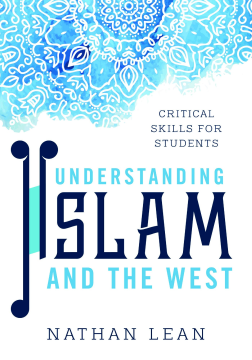
Additional Information
Book Details
Abstract
As the world’s second-largest faith and by some accounts the most fast-growing, Islam is often at the forefront of intense public conversation in debates about politics, international relations, globalization, modern society and culture.
From the rise of ISIS and revolutions in North Africa and Middle East to more tempered discussions about what it means to be a Muslim in the West and foreign policy making, this student focused textbook, unpacks how we talk about and represent Islam, its place in and relationship to “the West”.
Supported by an accessible introduction, real-world case studies, a glossary of terms and discussion points at the end of each chapter, Nathan Lean offers students a comprehensive and alternative framework to Islam and the West in the 21st Century
Nathan Lean pulls no punches in interrogating the “Islam and the West” binary that many well-meaning scholars and commentators inadvertently perpetuate. Understanding Islam and the West is both a brilliant refutation of this divisive discourse and a constructive response to it.
Todd Green, Associate Professor of Religion, Luther College
Lean provides a compelling and comprehensive examination of how Islam has been constructed in opposition to the West. He shows that contemporary discourses about Islam continue to produce a false belief that there is an essential incompatibility between Islam and Western societies. Lean produces a scholarly book relying on contemporary examples that beautifully unpacks how Islam continues to be reduced to a monolithic religion that encourages violence, misogyny and terror. The impact of this work will no doubt be far-reaching and long-lasting for decades to come. Clearly written and accessible to all, this book is urgent and a must-read.
Saher Selod, Assistant Professor of Sociology, Simmons College
Nathan Lean’s Understanding Islam and the West is a smart, timely, and accessible volume that takes on issues of ultimate urgency in our public discourse. Lean navigates issues of corporate media, Islamophobia, “clash of civilization” discourse, and cartoonish representations of Islamism and Shari’a. A democracy cannot thrive unless its citizens are well-educated. Lean’s book is a key contribution, and is highly recommended for students, scholars, members of the media, and policy makers.
Omid Safi, Director, Duke Islamic Studies Center
Amidst all the sound and fury about the supposed Muslim threat to the western world, Nathan Lean’s new book performs the essential task of encouraging us to consider the very categories through which Islam and the West are constructed. He considers, in accessible style, how ideas of essential difference are promoted and how they always emerge from, and play into, power agendas.
Peter Morey, co-author of Framing Muslims: Stereotyping and Representation after 9/11
Lean problematizes the conceptual frameworks that have for so long mischaracterized the understanding of Islam and the Muslim World. Lean posits a notion of the discourse of dualism that situates the West against all things Islamic. He then traces the ways with which these categories end up being reinforced in popular understandings, academic discourse, and more critically, the ways with which global actors frame conflict. By challenging linguistic constructs, this book takes the reader through a critical journey on the power of language and the false dichotomies that have for so long plagued the literature on Islam and Muslims. This timely text will benefit both students and the general public who want an introduction to the myriad of ways of understanding “Islam and the West”.
Dalia F. Fahmy, Associate Professor of Political Science, Long Island University
Nathan Lean is the author of several books, including The Islamophobia Industry (Pluto, 2012).
Interrogating the dualistic discourse of “Islam and the West,” Lean critiques the language employed by academics, news reporters, and politicians to reveal the ways specific groups of people construct “Islam” and “the West” in constant conflict. Arguing for linguistic precision and rejection of artificial representations, Lean encourages readers to reimagine a world based on commonalities, not imagined differences.
Melanie Trexler, Assistant Professor of Religion, Roanoke College
An effective counterblast against those who draw overly simplistic contrasts between ‘Islam’ and ‘the West’. Both of these terms represent within themselves a wide variety of ideas and practices, and the author makes it very clear that at least a measure of overlap between them urgently needs to be recognised, for the sake of the future of humanity.
Hugh Goddard, Honorary Professorial Fellow, the HRH Prince Alwaleed bin Talal Centre for the Study of Islam in the Contemporary World, University of Edinburgh
In this timely book, Nathan Lean examines the debates surrounding Islam and the West, expertly decoding the language that dominates public and political discourse. A book to be read by anyone who wants to understand why Islam and Muslims are often misunderstood in the world today, this is an ideal text for the classroom as well as the general reader. Anyone interested in politics, Islamophobia, and the power of language will profit from reading Lean’s work.
Sophia Rose Arjana, Assistant Professor of Religious Studies, Western Kentucky University
Table of Contents
| Section Title | Page | Action | Price |
|---|---|---|---|
| cover | a | ||
| frontmatter | i | ||
| contents | vii | ||
| acknowledgments | ix | ||
| transliterations | xi | ||
| chronology | xiii | ||
| introduction | 1 | ||
| part I | 21 | ||
| chapter 1 | 23 | ||
| chapter 2 | 43 | ||
| chapter 3 | 65 | ||
| part II | 77 | ||
| chapter 4 | 79 | ||
| chapter 5 | 97 | ||
| part III | 117 | ||
| chapter 6 | 119 | ||
| chapter 7 | 139 | ||
| chapter 8 | 159 | ||
| conclusion | 191 | ||
| glossary | 195 | ||
| bibliography | 201 | ||
| index | 207 |
